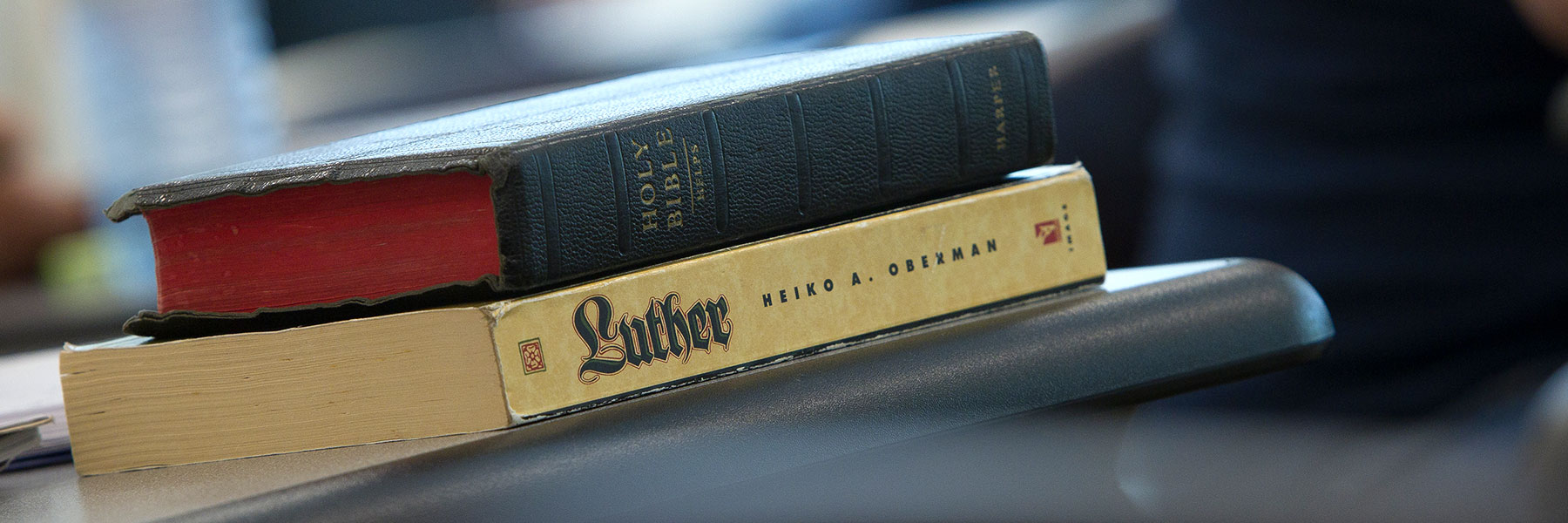In Bethany’s religion major, you will examine religion in the context of history, sociology, and philosophy. Our major assumes the perspective of confessional Lutheranism rooted in the Reformation heritage of Christ Alone. In this way our major is distinct from other religious studies programs.
Through your studies you will gain a deep understanding of Lutheran doctrine and tradition, the broader Christian tradition, and the fair comparison of that tradition with other major world religions. Additionally, the religion major provides a solid foundation for future studies in a variety of fields such as history, law, the social sciences, literature, and public administration.
Potential Careers
- Church development
- Missionary outreach
- Community development
- Religious life programming
- Counseling/crisis services
- Social services
- Family life center management
- Youth organizations
Contact for more information
Religion Faculty
These faculty members teach many of the courses required by the Religion Major. See also the Religion Department.
| Name | Title | Office / Phone | Courses | |
|---|---|---|---|---|
 | Mark DeGarmeaux ML 115 507-344-7429 | Professor | ML 115 507-344-7429 | |
 | Craig Ferkenstad | Adjunct Faculty | | |
 | Kyle Madson HH 107 | Adjunct Faculty | HH 107 | |
 | Tom Rank TC 112 507-344-7308 | Associate Professor | TC 112 507-344-7308 |
|
 | Shawn Stafford TC 113 507-344-7382 | Assistant Professor | TC 113 507-344-7382 | |
 Tom Rank
Tom RankAssociate Professor
TC 112
507-344-7308
- Introduction to Christianity I
- Introduction to Christianity II
- History of Israel
- The Gospel According to Isaiah
- Comparative World Religions
- Luther: His Ongoing Significance
- Psalms and Wisdom Literature of theOld Testament
- The Lutheran Confessions
- History of the Christian Church
- Topic: Survey of Christian Thought
- Religion Independent Study
Mission Statement
The mission of the religion major in the Christian liberal arts curriculum of Bethany Lutheran College is to prepare students for participation in the ongoing, in-depth discussion of religion in church and society. The context of our study assumes the perspective of confessional Lutheranism rooted in the Reformation heritage of Scripture Alone, Grace Alone, Faith Alone, and Christ Alone. Its content includes the rigorous study of the Lutheran tradition, the broader Christian tradition, the comparison of that tradition with other major world religions, and an exploration of how the social sciences and the field of communication connect with the study of religion. Course selection within the major allows students to follow their interests either into a historical/dogmatic emphasis or a Biblical studies emphasis, or to pursue a combination of both.
Program Learning Outcomes
- Biblical Knowledge: Demonstrate a working knowledge of the Bible by being able to explain its structure, history and chronology, genres (such as history, poetry, prophecy), canonicity, interpretation (hermeneutics), and Christocentricity (Christ-centeredness).
- Doctrinal knowledge: Describe and relate major doctrines of Christianity, such as: Trinity, Incarnation, Atonement/Justification, Law and Gospel, Means of Grace (Gospel in Word and Sacraments), and the Mission of the Church.
- Historical and denominational knowledge: Summarize and analyze the history and Creeds of the Christian Church by distinguishing between various religious traditions and denominations, and recognizing major thinkers, leaders, and movements.
- Cultural analysis: Reflect and analyze how the culture of Christianity relates to the cultures that surround it (for example, in regard to ethics, vocation, political-social issues, worship).
- Textual analysis: Demonstrate the ability to read and critically interpret other religious texts in the light of the Christian Scriptures.
- Techniques for Communicating: to polish with professional competence a work of formal academic writing, including documentation in the accepted style of the discipline, and to present a summary of one’ research orally.
Core Requirements
Required lower division courses:
- RELG110 Introduction to Christianity I 2 cr.
- RELG111 Introduction to Christianity II 2 cr.
- RELG2XX Second year religion elective 3 cr. or MUSC235 Hymnody and Liturgics 3 cr.
Required upper division courses:
- RELG316 Comparative World Religions 3 cr.
- RELG335 The Lutheran Confessions 3 cr.
- RELG340 Apologetics 3 cr.
- RELG480 Topics in Religious Studies 3 cr.
Major Electives
Choose four of the following courses:
- RELG320 Luther: His Ongoing Significance 3 cr.
- RELG325 Psalms and Wisdom Literature of the Old Testament 3 cr.
- RELG330 Christian Social Thought 3 cr.
- RELG360 History of the Christian Church 3 cr.
- RELG380 Pauline Literature 3 cr.
- RELG382 Johannine Literature 3 cr.
- RELG480 Topics in Religious Studies 3 cr.
- RELG495 Senior Seminar in Religious Studies 3 cr.
- RELGIND Independent Study (per Instructor’s approval) 3 cr.
Area of Emphasis
Completion of a minor in another academic discipline is required for this major.
Capstone
The minor in religion requires a minimum of 25 credits.
- RELG110 Introduction to Christianity I 2 cr.
- RELG111 Introduction to Christianity II 2 cr.
- Two religion (RELG) courses at the 200-level (MUSC235 Hymnody and Liturgics be counted as one of these) 6 cr.
- Upper division RELG courses 12 cr.
- GREK304 Advanced Greek: Plato’s Symposium: Plato’s Symposium and HIST460 Religion in American History History or one additional RELG course not already used in the minor 3-6 cr.
To view the most recent course list and requirements for the elementary education major, please consult the Academic Catalog.
Next Steps
Interested in studying at Bethany? Scheduling a campus visit is a great way to see what we have to offer. You can meet professors or sit in on a class too! Contact our admissions office to learn more.


